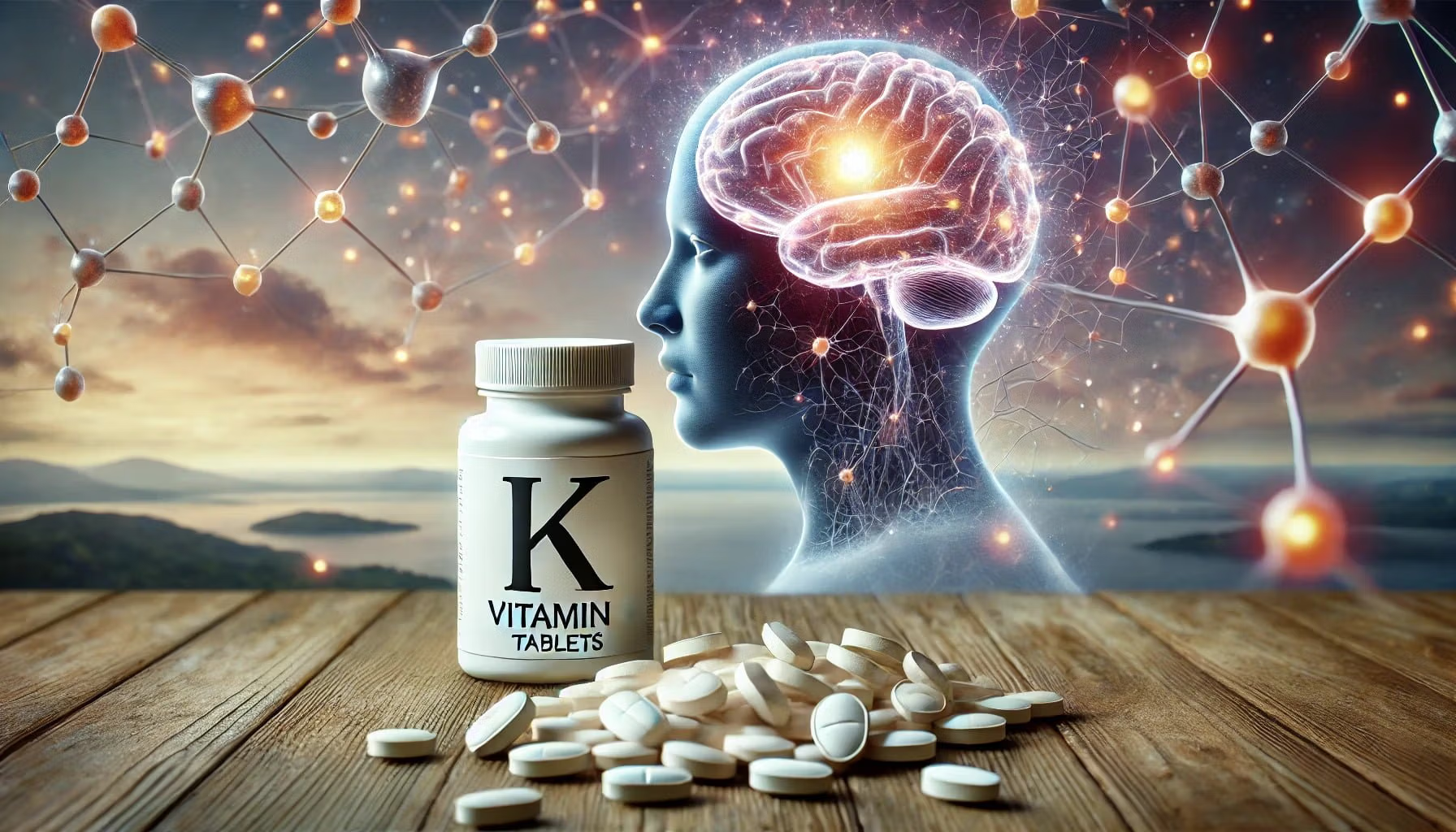
Vitamin K, a fat-soluble vitamin best known for its role in blood clotting, has a prominent role in maintaining and enhancing cognitive function.
This essential nutrient offers a range of brain-boosting benefits, from improving memory and recall to reducing age-related cognitive decline.
In the following, we’ll present the science behind Vitamin K’s neuroprotective properties and how it can help keep your mind sharp and resilient throughout life!
Table of Contents
What is Vitamin K?
Vitamin K is a group of fat-soluble vitamins that play a critical role in our brain and body.

Key functions of Vitamin K include the following:
- Blood Clotting: Vitamin K is essential for the synthesis of proteins required for blood coagulation. Without sufficient Vitamin K, the blood clotting process is impaired, leading to excessive bleeding.
- Bone Health: Vitamin K helps in the regulation of bone mineralization by activating proteins that bind calcium in the bones. This process is crucial for maintaining strong and healthy bones.
- Heart Health: Vitamin K may help prevent arterial calcification and promote cardiovascular health by inhibiting the deposition of calcium in blood vessels.
Vitamin K deficiency is rare but can occur in cases of malabsorption disorders, long-term use of antibiotics, or very poor dietary intake.
What Are The Dietary Sources of Vitamin K?
Sources of Vitamin K include the following:
- Vitamin K1 (phylloquinone): Green leafy vegetables (kale, spinach, broccoli), vegetable oils (soybean oil, canola oil), and some fruits.
- Vitamin K2 (menaquinone): Fermented foods (natto), dairy products, meat, and eggs.
- Vitamin K3 (menaphthone/menadione): A synthetic vitamin K used in animal feeds, unsuitable for human dietary supplements.
Vitamin K2 has several subtypes, with MK-4 and MK-7 being the most well-studied for their health benefits.
MK-4 is a short-chain menaquinone that is often used in supplements and fortified foods. MK-7, on the other hand, is a long-chain menaquinone that is naturally produced by the bacterium Bacillus subtilis during the fermentation of soybeans.
Comparison of vitamin K2 supplemental forms:
| Bioavailability | Source | Half-Life | Bioavailability |
|---|---|---|---|
| MK-4 | Supplements, fortified foods | 1-2 hours | Moderate |
| MK-7 | Fermented soybeans | 72 hours | High |
What Are The Cognitive Benefits of Vitamin K?
Key cognitive benefits of Vitamin K include:
- Improved memory and recall
- Enhanced learning and concentration
- Reduced risk of age-related cognitive decline
- Boosted mood and motivation

How Does Vitamin K Improve Memory and Recall?
Vitamin K improves memory and recall by supporting the synthesis of sphingolipids, a type of fat essential for proper brain cell signaling and communication.
According to a clinical study, higher dietary intake of Vitamin K was associated with better episodic memory performance in older adults.(1)
The nutrient’s role in regulating calcium homeostasis also contributes to its memory-enhancing effects, as calcium imbalances have been linked to cognitive impairment and dementia.
Moreover, Vitamin K has been shown to reduce inflammation in the brain, which can negatively impact memory and recall. A study demonstrated that individuals with higher Vitamin K intake had lower levels of inflammatory markers, such as interleukin-6 (IL-6), in their blood.(2)
How Does Vitamin K Enhance Learning and Concentration?
Vitamin K enhances learning and concentration by promoting the production of myelin, the insulating sheath around nerve fibers that facilitates rapid and efficient electrical impulses.
A study done in Switzerland demonstrated that Vitamin K2 supplementation improved spatial learning and memory in rats, likely due to its role in myelin synthesis.(3)
The nutrient’s anti-inflammatory properties also contribute to better cognitive function, as chronic inflammation has been linked to impaired learning and concentration.
How Does Vitamin K Reduce Age-Related Cognitive Decline?
Vitamin K reduces age-related cognitive decline by combating oxidative stress, a major contributor to brain aging and neurodegenerative diseases.
According to a 12-month randomized controlled trial from the Journal of Alzheimer’s disease, Vitamin K2 supplementation reduces oxidative stress and improves cognitive function in older adults with mild cognitive impairment.(4)
The nutrient’s ability to activate proteins involved in cellular energy production and mitochondrial function also helps maintain brain health in later life.
How Does Vitamin K Provide Neuroprotection?
Vitamin K protects cognitive health by regulating the formation and clearance of amyloid-beta, a protein that can accumulate in the brain and contribute to Alzheimer’s disease.
A study found that Vitamin K2 supplementation reduced amyloid-beta accumulation and improved cognitive performance by 42% in a mouse model of Alzheimer’s.(5)
The nutrient’s role in supporting healthy blood vessels and cerebral blood flow also contributes to its neuroprotective effects, as vascular dysfunction is a risk factor for cognitive decline.
How Does Vitamin K Boost Mood and Motivation?
Vitamin K boosts mood and motivation by modulating the production and release of neurotransmitters involved in emotional regulation, such as serotonin and dopamine.
Serotonin is known as the “feel-good” neurotransmitter, while dopamine plays a key role in reward-seeking behavior and motivation.
A study based on information from a National Health and Nutrition Examination Survey found that Vitamin K supplementation improved self-reported mood and reduced symptoms of depression in healthy older adults.(6)
The authors propose that Vitamin K’s influence on calcium balance and neurotransmitter signaling may underlie its mood-enhancing effects.
What Are The Side Effects and Risks Associated with Vitamin K Supplementation?
Vitamin K is well-tolerated, and side effects are rare when consumed in recommended doses. However, high doses of Vitamin K may cause:
- Digestive issues, such as bloating or diarrhea
- Increased risk of blood clotting in individuals with certain health conditions
- Interactions with anticoagulant medications, such as warfarin

Who Should Avoid Using Vitamin K as A Nootropic?
Individuals with the following conditions should avoid using Vitamin K without medical supervision:
- Blood clotting disorders, such as thrombosis or hypercoagulability
- Liver or kidney disease, which may affect Vitamin K metabolism
- Those taking anticoagulant medications, like Vitamin K, may interfere with their effectiveness
- Pregnant and breastfeeding women should also consult their healthcare provider before taking Vitamin K supplements.
Are There Any Known Medical Interactions With Vitamin K?
Vitamin K interacts with several medications, including:
- Anticoagulants (blood thinners): Vitamin K may reduce the effectiveness of anticoagulants like warfarin, increasing the risk of blood clots.
- Antibiotics: Some antibiotics, such as cephalosporins and salicylates, may decrease Vitamin K levels in the body.
- Bile acid sequestrants: These medications, used to lower cholesterol, may reduce the absorption of Vitamin K.
How To Use Vitamin K as A Nootropic?
To use Vitamin K as a nootropic, follow these guidelines:
- Choose a high-quality Vitamin K supplement, preferably containing both K1 and K2 forms.
- Start with the recommended dosage and adjust as needed based on your response and your healthcare provider’s advice.
- Take Vitamin K with a meal containing healthy fats to enhance absorption.
- Be consistent with supplementation to maintain optimal Vitamin K levels in the body.
Pro Tip: While vitamin K1 is essential for blood clotting, vitamin K2, particularly MK-7, has shown more promise in supporting cognitive health and neuroprotection.
What Are The Different Types of Vitamin K Supplements?
There are several types of vitamin K supplements that are available:
| Type | Available Forms |
|---|---|
| Vitamin K1 (Phylloquinone) | Oral tablets, capsules, and liquid drops |
| MK-4 (Menaquinone-4) | Capsules and tablets |
| (Menaquinone-7) | Capsules, tablets, and liquid drops. |
Additionally, many multivitamins include Vitamin K, along with other essential vitamins and minerals.
Choosing the right type of Vitamin K supplement depends on individual health needs and dietary intake.
What is The Recommended Dosage of Vitamin K?
The recommended daily intake (RDI) and dosage of Vitamin K varies by age and sex:
| Person | Dosage |
|---|---|
| Adult men | 120 mcg per day |
| Adult women | 90 mcg per day |
| Cognitive benefits | 45-50 mg per day |
How to Use Vitamin K in A Nootropic Stack?
Vitamin K can be combined with other nootropics to enhance cognitive performance:
- Vitamin K + Vitamin D3: Vitamin D3 works synergistically with Vitamin K to support brain health and cognitive function.
- Vitamin K + Omega-3 fatty acids: Omega-3s, particularly DHA, are essential for brain health and may enhance the cognitive benefits of Vitamin K.
- Vitamin K + Phosphatidylserine: This combination may improve memory, learning, and overall cognitive performance.
- Presse, Nancy et al. “Vitamin K status and cognitive function in healthy older adults.” Neurobiology of aging vol. 34,12 (2013): 2777-83. doi:10.1016/j.neurobiolaging.2013.05.031↩
- Visser, Margot P J et al. “Effects of Vitamin D and K on Interleukin-6 in COVID-19.” Frontiers in nutrition vol. 8 761191. 17 Jan. 2022, doi:10.3389/fnut.2021.761191↩
- Elkattawy, Hany A et al. “Vitamin K2 (Menaquinone-7) Reverses Age-Related Structural and Cognitive Deterioration in Naturally Aging Rats.” Antioxidants (Basel, Switzerland) vol. 11,3 514. 8 Mar. 2022, doi:10.3390/antiox11030514↩
- Yang, Tong et al. “Vitamin D Supplementation Improves Cognitive Function Through Reducing Oxidative Stress Regulated by Telomere Length in Older Adults with Mild Cognitive Impairment: A 12-Month Randomized Controlled Trial.” Journal of Alzheimer’s disease : JAD vol. 78,4 (2020): 1509-1518. doi:10.3233/JAD-200926↩
- Popescu, Alexander, and Monica German. “Vitamin K2 Holds Promise for Alzheimer’s Prevention and Treatment.” Nutrients vol. 13,7 2206. 27 Jun. 2021, doi:10.3390/nu13072206↩
- Zhang, Yuyi et al. “Association between vitamin K intake and depressive symptoms in US adults: Data from the National Health and Nutrition Examination Survey (NHANES) 2013-2018.” Frontiers in nutrition vol. 10 1102109. 22 Mar. 2023, doi:10.3389/fnut.2023.1102109↩

